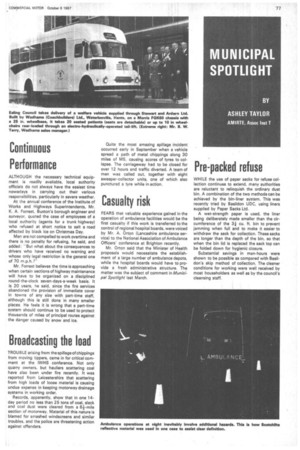MUNICIPAL SPOTLIGHT
Page 79

If you've noticed an error in this article please click here to report it so we can fix it.
BY ASHLEY TAYLOR
AMIRTE, Assoc lost T
Continuous Performance
ALTHOUGH the necessary technical equipment is readily available, local authority officials do not always have the easiest time nowadays in carrying out their various responsibilities, particularly in severe weather.
At the annual conference of the Institute of Works and Highways Superintendents, Mr. K. A. Forrest, Buxton's borough engineer and surveyor, quoted the case of employees of a local authority (agents for a trunk highway) who refused at short notice to salt a road affected by black ice on Christmas Day.
Men are not compelled to work overtime and there is no penalty for refusing, he said, and added: "But what about the consequences to drivers who have received no warning and whose only legal restriction is the general one of 70 m.p.h.?"
Mr. Forrest believes the time is approaching when certain sections of highway maintenance will have to be organized on a disciplined round-the-clock seven-days-a-week basis. It is 20 years, he said, since the fire services abandoned the provision of immediate cover in towns of any size with part-time staff, although this is still done, in many smaller places. He feels it is wrong that a part-time system should continue to be used to protect thousands of miles of principal routes against the danger caused by snow and ice.
Broadcasting the load
TROUBLE arising from the spillage of chippings from moving tippers, came in for critical comment at the IWHS conference. Not only quarry owners, but hauliers scattering coal have also been under fire recently. It was reported from Leicestershire that scattering from high loads of loose material is causing undue expense in keeping motorway drainage systems in working order.
Records, apparently, show that in one 14day period no less than 25 tons of coal, slack and coal dust were cleared from a 61-mile section of motorway. Material of this nature is blamed for smashed windscreens and similar troubles. and the police are threatening action against offenders. Quite the most amazing spillage incident occurred early in September when a vehicle spread a path of metal chippings along 30 miles of M5, causing scores of tyres to collapse. The carriageway had to be closed for over 12 hours and traffic diverted. A team of men was called out, together with eight sweeper-collector units, one of which also punctured a tyre while in action.
Casualty risk
FEARS that valuable experience gained in the operation of ambulance facilities would be the first casualty if this work is transferred to the control of regional hospital boards, were voiced by Mr. A. Orton (Lancashire ambulance service) to the National Association of Ambulance Officers conference at Brighton recently.
Mr. Orton said that the Minister of Health proposals would necessitate the establishment of a large number of ambulance depots, while the hospital boards would have to provide a fresh administrative structure. The matter was the subject of comment in Municipal Spotlight last March.
Pre-packed refuse
WHILE the use of paper sacks for refuse collection continues to extend, many authorities are reluctant to relinquish the ordinary dust bin. A combination of the two methods can be achieved by the bin-liner system. This was recently tried by Basildon UDC, using liners supplied by Paper Sacks Ltd.
A wet-strength paper is used, the liner being deliberately made smaller than the circumference of the 3+ cu. ft. bin to prevent jamming when full and to make it easier to withdraw the sack for collection. These sacks are longer than the depth of the bin, so that when the bin lid is replaced the sack top can be folded down for hygienic closure.
Substantial savings in man-hours were shown to be possible as compared with Basildon's skip method of collection. The cleaner conditions for working were well received by most householders as well as by the council's cleansing staff.
































































































































